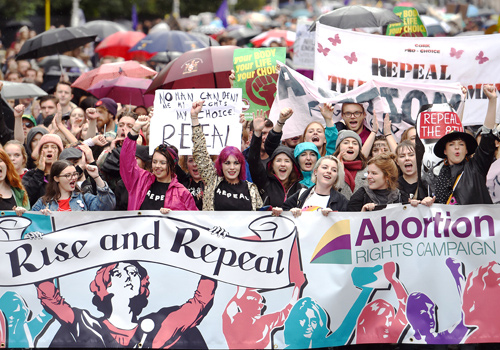LONDON — In response to a growing campaign for abortion rights, Irish Prime Minister Leo Varadkar announced Jan. 29 that a referendum will be held in Ireland this spring on repealing the Eighth Amendment to the Constitution. The amendment, approved in a 1983 public vote, “acknowledges the right to life of the unborn” and effectively prevents women’s access to abortion.
“We welcome the decision,” Linda Kavanagh, spokesperson for the Abortion Rights Campaign, told the Militant in a phone interview from Dublin. “Without a repeal of the Eighth Amendment there is no way to extend the right to abortion.”
Support for a woman’s right to abortion has grown as part of a broader shift in backing for social rights in Ireland. In 2015 a change to the Constitution to legalize the right of same sex couples to marry was approved 62 to 38 percent. “It’s a historical day for Ireland,” Varadkar, then health minister, said at the time, “a social revolution.” He had come out as gay during the run-up to the vote.
Currently abortion is only allowed when a woman’s life is at immediate risk, but not even in cases of rape, incest or fatal fetal abnormality. Fear of prosecution makes doctors reluctant to use the procedure.
The fight heated up after Savita Halappanavar, a 31-year-old dentist, died on Oct. 28, 2012, after University Galway Hospital authorities refused to give her an abortion. She went to the hospital in extreme pain as she was having a miscarriage that was blocked. She got septicemia, several organs began to fail, but hospital authorities said there was nothing they could do, because Ireland is “a Catholic country.”
Within weeks protests were mounted in towns across Ireland, including in Galway. Some 10,000 people marched in Dublin, protesting her death and the constitution’s onerous restrictions on access to abortion.
“Several things came together in 2012. In the summer before Halappanavar’s death there was a quite active anti-choice campaign with posters going up all over Dublin,” Kavanagh said. “People reacted to both these things and the Abortion Rights Campaign was formally launched in January 2013.”
Sustained campaigning across the island — both in the North and the south — has placed abortion rights firmly on the agenda, despite opposition by the ruling parties and Roman Catholic Church. In Dublin, Fianna Fáil and Fine Gael now say their members will have a free vote on repeal of the Eighth Amendment. In Northern Ireland, the Democratic Unionist Party and republican party Sinn Féin have both opposed extending to Northern Ireland a 1967 British law that legalized abortion. Sinn Féin last year did adopt a motion accepting “the need for the availability of abortion where a woman’s life, health or mental health is at serious risk.”
Demonstrations in Dublin, Belfast and London in September and October 2017 mobilized growing support for changing the law. Between 30,000 and 40,000 marched in Dublin.
More than 3,500 Irish women seeking abortions are estimated to travel abroad every year, an average of 12 per day. Most go to England.
The trip puts greater burdens on working women, because of the costs involved — up to £2,000 ($2,765) for travel, accommodation and the procedure. Others can’t take time away from work. These women are left with two choices — take illegal abortion pills ordered online or give birth. The estimated three women who take the pills every day live in the fear that some complication will force them to go to a doctor and face possible prosecution.
At least 700 women traveled from Northern Ireland to England in 2016 to get access to abortion. In June 2017 the U.K. government announced a decision to finance abortion costs for women from Northern Ireland who travel elsewhere in the U.K. to have the procedure. In October that was extended to cover travel costs in “hardship cases.”
The Abortion Rights Campaign is planning to mobilize to win the referendum. “We will have stalls out every weekend in Dublin and around the country,” Kavanagh said. “The response to our stalls is overwhelmingly positive. Most people appreciate having more information.” A protest is being organized March 8, assembling at 5:30 pm at the Garden of Remembrance and marching to the Dáil in Dublin.


